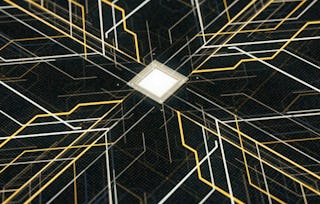This course will complete the GPU specialization, focusing on the leading libraries distributed as part of the CUDA Toolkit. Students will learn how to use CuFFT, and linear algebra libraries to perform complex mathematical computations. The Thrust library’s capabilities in representing common data structures and associated algorithms will be introduced. Using cuDNN and cuTensor they will be able to develop machine learning applications that help with object detection, human language translation and image classification.

CUDA Advanced Libraries
Seize the savings! Get 40% off 3 months of Coursera Plus and full access to thousands of courses.

CUDA Advanced Libraries
This course is part of GPU Programming Specialization

Instructor: Chancellor Thomas Pascale
3,711 already enrolled
Included with
21 reviews
Recommended experience
What you'll learn
You will learn to develop software that performs high-level mathematics operations using libraries such as cuFFT and cuBLAS.
You will learn to use the Thrust library to perform a number of data manipulation and data structures that abstract away memory management.
You will learn to develop machine learning software for a variety of purposes using neural networks modeled using the cuTensor and cuDNN libraries.
Skills you'll gain
Tools you'll learn
Details to know

Add to your LinkedIn profile
See how employees at top companies are mastering in-demand skills

Build your subject-matter expertise
- Learn new concepts from industry experts
- Gain a foundational understanding of a subject or tool
- Develop job-relevant skills with hands-on projects
- Earn a shareable career certificate

There are 5 modules in this course
The purpose of this module is for students to understand how the course will be run, topics, how they will be assessed, and expectations.
What's included
4 videos1 programming assignment1 discussion prompt1 ungraded lab
cuFFT provides the ability to perform fast Fourier transforms (FFTs) on large datasets. Students will learn of common use cases such as fast multiplication of large polynomials, signal processing, and matrix operations. They will use this library to develop software that process audio or video signals.
What's included
6 videos1 reading1 programming assignment1 discussion prompt1 ungraded lab
The CUDA Toolkit includes a number of linear algebra libraries, such as cuBLAS, NVBLAS, cuSPARSE, and cuSOLVER. Students will learn the different capabilities and limitations of many of them and apply that knowledge to compute matrix dot products, determinant, and finding solutions to complex linear systems.
What's included
6 videos1 reading1 programming assignment1 discussion prompt1 ungraded lab
Most developers utilize data structures beyond the primitives and pointers that make up the core of CUDA programmers, which makes pure CUDA development difficult. Students will learn about the Thrust library that adds the vector data structure and associated algorithms that allow for simplification of their code. Students will create software that transform, reduction, and sort large datasets.
What's included
7 videos1 reading1 programming assignment1 ungraded lab
Data Scientists, Machine Learning, and Artificial intelligence experts are using neural networks to solve problems such as human language translation, image classification, and object detection/avoidance. Using the cuDNN and cuTensor, students will be able to develop a variety of neural networks and similar structures. At the completion of this module students will be asked to develop a course-wide project that brings together their knowledge from all previous courses and lessons to develop a capstone software project.
What's included
6 videos1 reading1 peer review1 discussion prompt3 ungraded labs
Earn a career certificate
Add this credential to your LinkedIn profile, resume, or CV. Share it on social media and in your performance review.
Instructor

Offered by
Explore more from Algorithms
 Status: Free Trial
Status: Free TrialJohns Hopkins University
 Status: Free Trial
Status: Free TrialJohns Hopkins University
 Status: Free Trial
Status: Free TrialJohns Hopkins University
 Status: Free Trial
Status: Free TrialJohns Hopkins University
Why people choose Coursera for their career

Felipe M.

Jennifer J.

Larry W.

Chaitanya A.

Open new doors with Coursera Plus
Unlimited access to 10,000+ world-class courses, hands-on projects, and job-ready certificate programs - all included in your subscription
Advance your career with an online degree
Earn a degree from world-class universities - 100% online
Join over 3,400 global companies that choose Coursera for Business
Upskill your employees to excel in the digital economy
Frequently asked questions
To access the course materials, assignments and to earn a Certificate, you will need to purchase the Certificate experience when you enroll in a course. You can try a Free Trial instead, or apply for Financial Aid. The course may offer 'Full Course, No Certificate' instead. This option lets you see all course materials, submit required assessments, and get a final grade. This also means that you will not be able to purchase a Certificate experience.
When you enroll in the course, you get access to all of the courses in the Specialization, and you earn a certificate when you complete the work. Your electronic Certificate will be added to your Accomplishments page - from there, you can print your Certificate or add it to your LinkedIn profile.
Yes. In select learning programs, you can apply for financial aid or a scholarship if you can’t afford the enrollment fee. If fin aid or scholarship is available for your learning program selection, you’ll find a link to apply on the description page.
More questions
Financial aid available,

